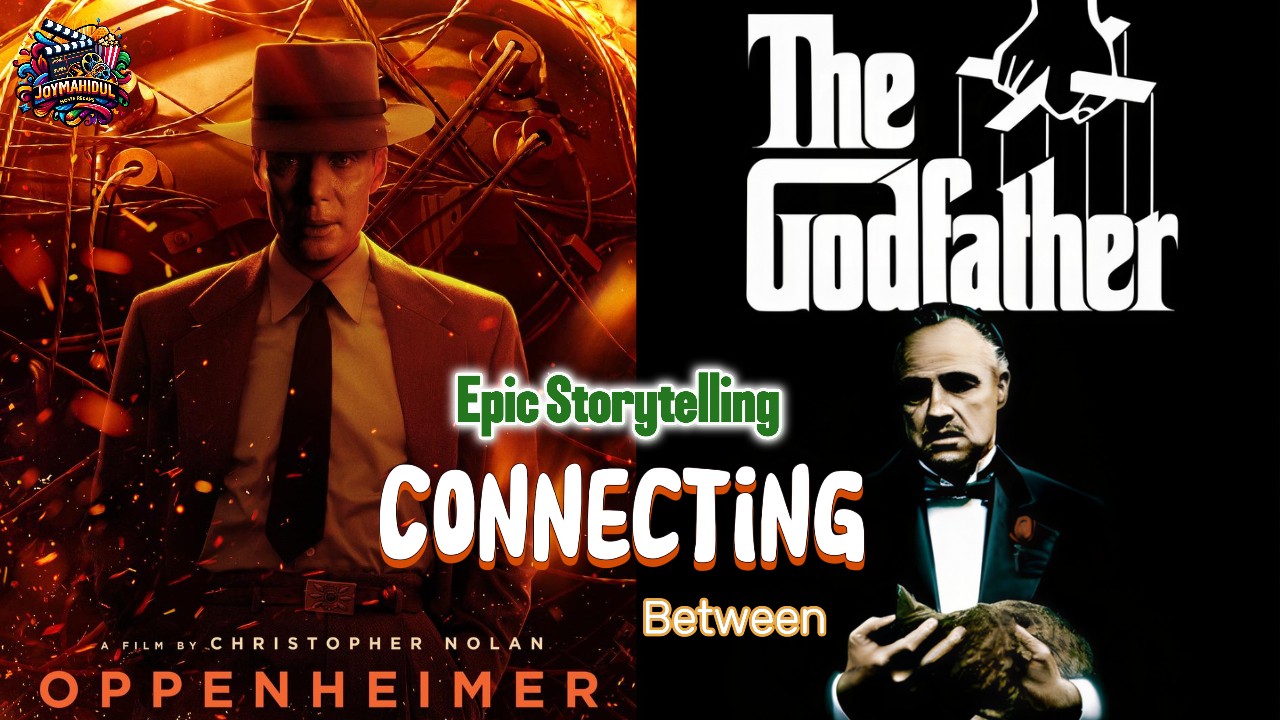Epic Storytelling: Dive into the worlds of The Godfather and Oppenheimer. In these narratives, moral dilemmas influence the course of events. The burden of power shapes the destinies of iconic characters.
Key Themes of Epic Storytelling in The Godfather and Oppenheimer
- Moral Dilemmas and Power Struggles
- Legacy and Its Consequences
Introduction
When it comes to great movies, very few films show the importance of history like The Godfather (1972). Oppenheimer (2023) also demonstrates this well. These films also highlight themes of right and wrong and personal sacrifice. Directed by Francis Ford Coppola, The Godfather explores power, loyalty, and family in organized crime. Christopher Nolan’s Oppenheimer examines the personal and moral issues faced by J. Robert Oppenheimer, the man who made the atomic bomb. At first, these films may seem very different. However, a closer look shows they have many things in common in their powerful storytelling.
Both films show the main characters dealing with huge responsibilities that affect their futures and the futures of others. The strong themes of ambition, right and wrong, and consequences connect these two stories. The Godfather and Oppenheimer examine how the choices made by powerful people impact entire communities.
In this analysis, we will examine the similarities between these two big movies. We will explore how both films tell stories that deal with important moral issues. Additionally, we will discuss their historical meaning and the personal effects of great power.
For a more detailed review of The Godfather, click here, and for a full exploration of Oppenheimer, click here.
Key Themes of Epic Storytelling
- Moral Dilemmas
In The Godfather, Michael Corleone must decide if he wants to join the family business. He struggles with the bad side of power and his part in ongoing violence. In Oppenheimer, J. Robert Oppenheimer also deals with the moral issues of making a weapon that can kill millions. The choices of both characters lead to terrible events, showing how personal decisions can have serious effects. - The Burden of Power
Both Michael Corleone and J. Robert Oppenheimer struggle with the power they have. Michael inherits his father’s empire but feels pulled between wanting a normal life and his duties to the family business. Oppenheimer deals with the heavy burden of the atomic bomb, which can cause massive destruction. In both stories, the heavy weight of power causes deep personal conflict and ultimately breaks down their lives. - Family and Legacy
The Godfather focuses on legacy, where family loyalty and traditions are key. Michael must choose between keeping his family’s criminal legacy or creating his own path. Oppenheimer deals with the legacy of his invention. He grapples with the atomic bomb’s lasting consequences. Both films show how our actions affect future generations, whether through family ties or the historical effects of our inventions. - Historical and Cultural Impact
The Godfather is a groundbreaking film. It changed how we see organized crime. It also changed how we view family issues. Oppenheimer is a key film that looks at the creation and moral questions of the atomic bomb, which changed history. Both films reflect their times and have a lasting effect on people and culture.
Conclusion
The Godfather and Oppenheimer are great examples of powerful storytelling. They show characters facing tough moral choices. Michael Corleone goes from a war hero to a harsh mafia leader, while J. Robert Oppenheimer shifts from a hopeful scientist to a man weighed down by the results of his own brilliance. These films look at the complicated nature of human choices and their wide-ranging effects.
Both films mix history, personal battles, and moral dilemmas. They encourage viewers to think about power, legacy, and what it means to be human. Their grand storytelling goes beyond their genres, creating stories that still connect with people today.
For more insights and a deeper look into both films, check out our detailed reviews on The Godfather and Oppenheimer.
If you’re looking for answers to some of the most common questions about Oppenheimer, visit our Oppenheimer FAQ page. You can find more information there!
Connecting The Godfather and Oppenheimer in a Short Story
If you enjoyed the deep dive into The Godfather and Oppenheimer’s themes, here’s a small fictional story. It blends both films into a single narrative.
The Price of Power:
Power is both a gift and a curse. In such a world, two men, Victor Castrianni and Dr. Jonathan Rayburn, navigate the weight of their legacies. Victor is caught between a criminal empire and his dream of a legitimate life. Rayburn is a scientist struggling with the moral consequences of creating the atomic bomb. They both face choices that will alter their futures. This gripping 10-part story explores the burden of power, moral dilemmas, and the quest for redemption.
To read the full story, click here: The Price of Power – Part 1
5 FAQs About The Godfather and Oppenheimer
1. What is the main theme of The Godfather?
The primary theme of The Godfather is the tension between family loyalty and personal morality. It explores how power, ambition, and responsibility shape the choices of its characters, especially Michael Corleone, as he transitions from a reluctant outsider to a ruthless mafia leader.
2. What moral dilemmas does Oppenheimer face in the movie?
In Oppenheimer, J. Robert Oppenheimer grapples with the ethical consequences of creating the atomic bomb. He questions whether advancing science justifies its destructive potential and struggles with the personal guilt of contributing to an invention that reshaped humanity’s future.
3. How do both films address the burden of power?
Both films showcase protagonists overwhelmed by the responsibilities that come with power. In The Godfather, Michael Corleone is torn between protecting his family’s legacy and the personal cost of violence. In Oppenheimer, J. Robert Oppenheimer bears the psychological weight of creating a weapon capable of mass destruction.
4. What historical impact do these films explore?
The Godfather provides a cultural commentary on organized crime and its intersection with family and loyalty, reshaping perceptions of the mafia in cinema. Oppenheimer dives into the ethical and historical consequences of the Manhattan Project, highlighting the atomic bomb’s role in altering global politics and warfare.
5. How are legacy and consequences portrayed in these films?
In The Godfather, legacy is tied to family honor and the continuation of traditions, even if they involve crime. Michael struggles to uphold this legacy while facing the consequences of his choices. In Oppenheimer, legacy revolves around scientific innovation and its long-term implications, as J. Robert Oppenheimer wrestles with the moral repercussions of his groundbreaking work.



